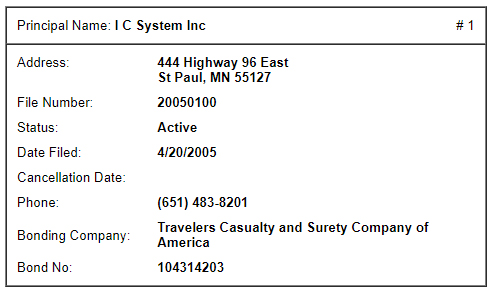How to Defend a Lawsuit from IC System
Confronting a lawsuit can be a challenging experience, especially when it comes from a debt buyer like IC System in Texas, a company you might not be familiar with. Understanding your legal rights and options is essential when facing such a situation. Our team of Texas Debt Defense Attorneys offer insights into dealing with IC Systems and strategies for handling a lawsuit from them.
Is IC System Legit?
Yes, IC Systems is a legitimate company. IC Systems is a debt buyer that engages in the business of buying charged-off and defaulted consumer debts from creditors. IC Systems is not a law firm. They specialize in buying debts from creditors and then pursuing collection actions, including litigation against consumers in Texas.
IC System is a Registered Debt Collector
IC Systems operates as a debt buyer and is registered in Texas. In Texas, while there is no specific licensing requirement for debt collectors, a surety bond filed with the Texas Secretary of State is mandatory. IC System has a debt collection bond on file with the Texas Secretary of State issued by Travelers Casualty and Surety Company of America.

What Kinds of Debts Does IC System Collect?
IC Systems primarily deals with purchased debts from original creditors. Their portfolio typically includes debts from credit cards, personal loans, and other consumer financial products. By buying these debts, they assume the role of the creditor and initiate collection efforts, which may include legal action against consumers.
How to Defend a Lawsuit from IC Systems
Responding to a Lawsuit from IC Systems If you find yourself targeted by a lawsuit from IC Systems for debt collection, it’s crucial to take prompt and strategic action:
- Do Not Overlook the Lawsuit: Ignoring it could lead to a default judgment, potentially resulting in bank garnishments, liens, or seizures.
- Consult an Experienced Debt Defense Lawyer: Our lawyers at Jaffer & Associates excel in helping Texans effectively handle collection cases, ensuring you understand your legal position, the authenticity of the debt, and potential defenses.
- Respond Timely to the Lawsuit: Failing to respond promptly might result in a default judgment. You have 14 days to respond if you are sued by IC Systems in a Justice of the Peace Court. Otherwise, you have 20 days from being served the lawsuit if the case was filed in a County of District Court in Texas.
- Consider Settlement or Legal Challenge: Depending on your situation, settling the lawsuit, or contesting it in court are viable options. Settlements can be advantageous in reducing debt amounts and getting a manageable payment plan. Whereas challenging the lawsuit is suitable if there are flaws in the creditor’s case, such as incorrect debt amounts, expired statutes of limitations, mistaken identity, or identity theft.
- Challenge the Lawsuit’s Merits: Your lawyer can help identify any inaccuracies or errors in the lawsuit, such as incorrect debt amounts or mistaken identity. Uncovering these issues can be critical in defending against the lawsuit.
- Discovery and Getting a Dismissal:
One major element of defending the case is to verify if the creditor has all records necessary to prove up their claim. In debt collection lawsuits you or your attorney should request all credit card statements, bills of sales, and purchase and sales agreements to ensure that the party suing has the right to sue for the consumer debt. This happens in discovery during a lawsuit and can lead to a lawsuit being dismissed if done correctly. - Negotiate a Settlement: If IC Systems presents a strong and meritorious case then negotiating a settlement for a much lower amount may be the wise approach. Often, settlements can be negotiated to amounts significantly lower than the original debt and payment plans are also available.
- Filing a Counterclaim:You may be able to file a counterclaim for violation of the Fair Debt Collection Practices “FDCPA” or the Fair Credit Reporting Act “FCRA”. This occurs if the creditor or debt buyer engages in practices or conduct prohibited under these federal consumer protection laws. An experienced attorney such as the attorneys at Jaffer & Associates looks for all sorts of violations during the defense of your lawsuit.
How to Attack the Chain of Title with a Debt Buyer
The chain of title refers to the sequence of historical transfers of a debt from the original creditor to subsequent buyers. In debt collection cases, especially those involving debt buyers, it’s not uncommon to find gaps or inaccuracies in this chain.
Discovery is a critical phase where you can request evidence to establish or refute the validity of the debt buyer’s claim. The focus should be on obtaining:
- Purchase and Sale Agreements: These documents between the original lender and subsequent buyers outline the terms of the debt sale. They may include specific details about the debts sold, warranties, and the rights transferred.
- Bills of Sale: These are the actual transaction documents that transfer the debt from one entity to another. They should correspond with the purchase agreements and explicitly reference the specific debt in question.
- Additional Documentation: This may include account statements, original credit agreements, and correspondence related to the debt, offering a comprehensive view of the debt’s history.
Strategies in Utilizing Discovery
- Request Comprehensive Documentation: Ensure that every transfer of the debt is accounted for through bills of sale and purchase agreements. Missing or incomplete documents can be a strong defense point.
- Scrutinize the Details: Look for discrepancies in amounts, dates, or parties involved. Inconsistencies can undermine the plaintiff’s claim to ownership of the debt.
- Challenge Standing: If the debt buyer cannot prove they legally own the debt, they may lack standing to sue. This argument can be pivotal in getting the case dismissed.
- Negotiate Settlements: If the chain of title is unclear but not completely broken, use this as leverage in settlement negotiations, potentially leading to a more favorable outcome for your client.
Under Texas law, as in many jurisdictions, the plaintiff in a debt collection lawsuit bears the burden of proof. They must demonstrate their legal right to collect the debt. Texas courts have consistently held that a broken chain of title can invalidate a debt buyer’s claim.
How Much Does a Debt Defense Attorney Charge?
We at Jaffer & Associates charge a Flat Fee for your lawsuit defense based on the amount of the lawsuit. You can either pay upfront in full or we can provide you with a flexible payment plan.
SEE OUR PRICING


